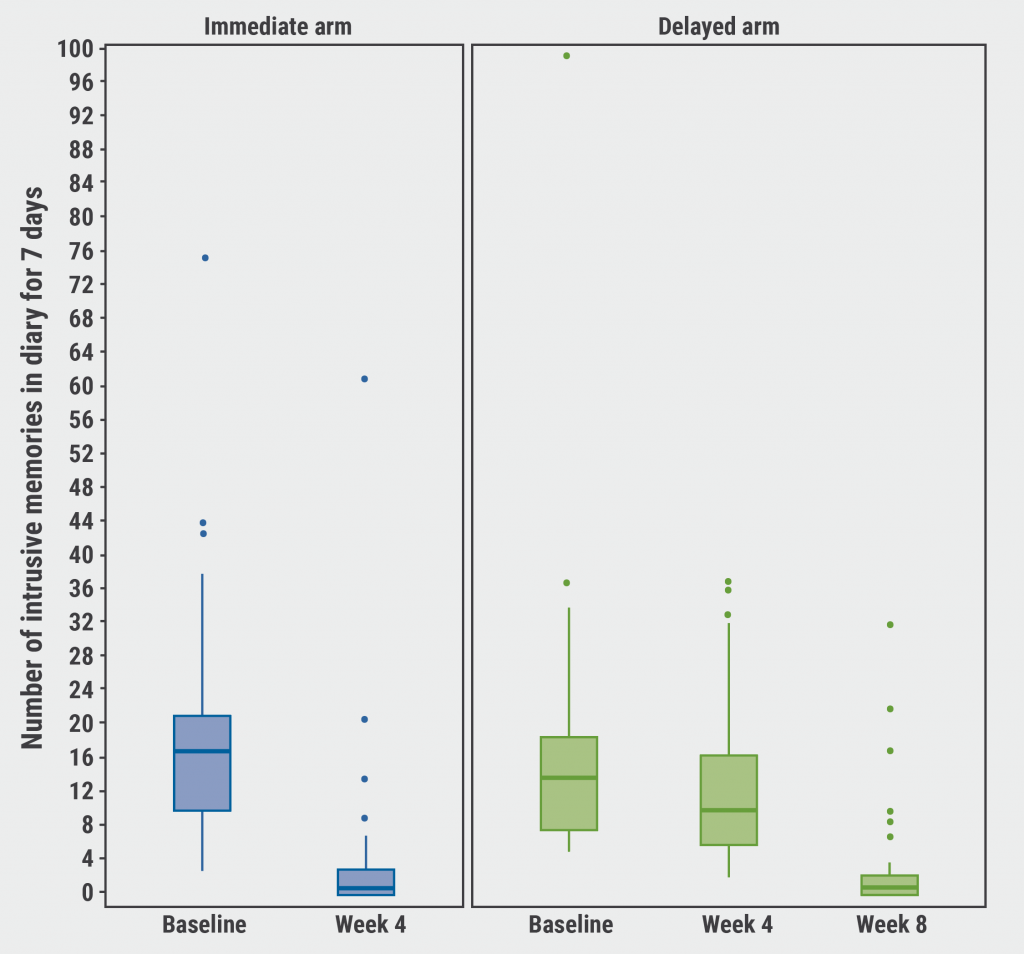https://doi.org/10.55788/348c5c6d
During the COVID-19 pandemic, many healthcare workers, in particular those working in ICUs and caring for COVID-19 patients, experienced stressful or even traumatic psychological events from their daily work, causing mental disorders like anxiety, depression, alcohol misuse, and post-traumatic stress disorder (PTSD) [1]. Prof. Emily Holmes (Uppsala University, Sweden) presented results from a novel intervention aimed at decreasing intrusive memories, a core symptom of PTSD [2]. This intervention is based on the idea that the vividness and intensity of a visual memory brought to mind can be updated and limited by another visually engaging task. In the GAINS trial (NCT04992390; https://www.p1vital-gains.com/), this task was playing the computer game Tetris for 20 minutes after the traumatic memory was brought to mind. Tetris was chosen because the inherent ‘mental rotation task’ maximises the visual working memory load, Prof. Holmes explained. In a proof-of-concept study, the same intervention proved to be feasible and effective for patients within 6 hours of a motor vehicle accident and the observed effect was persistent [3,4].
In the GAINS trial, 86 healthcare workers who reported intrusive memories from working in an ICU during the COVID-19 pandemic were enrolled and randomised 1:1 to immediate access to the intervention for 4 weeks versus delayed access after usual care for 4 weeks. On average, participants experienced more than 35 work-related traumas, most of which had taken place over 3 months before entering the trial. More than 30% of participants reported 1 or more new traumatic events during the trial. A researcher guided the first interventional session; thereafter the intervention was used independently by the participants, with the option for support. The primary outcome of GAINS was the number of intrusive memories in week 4.
In participants who had immediate access to the intervention, the median number of intrusive memories decreased from 14 per week at baseline to 1 per week at week 4. In contrast, in participants who had usual care, the median number of intrusive memories decreased from 14 to 10 per week. After having accessed the intervention at week 4, these participants also had a decrease in the frequency of intrusive memories to a median of 1 per week at week 8 (see Figure) [5]. No side effects of the intervention were observed and the participants found the intervention easy to use and more convenient than talking therapy.
Figure: Immediate and delayed access to gameplay intervention show a similar effect [2]

Based on these results, Dr Holmes concluded that “this gameplay intervention shows promise for further development.”
- Lamb D, et al. Occup Environ Med. 2021;78:801–808.
- Holmes EA, et al. Gameplay to reduce replay? Targeting intrusive memories after trauma via an imagery competing task intervention including Tetris. Abstract S06.01, ECNP Congress 2022, 15–18 October, Vienna, Austria.
- Iyadurai L, et al. Mol Psychiatry. 2018;23:674–682.
- Kanstrup M, et al. Transl Psychiatry. 2021;11:30.
- Ramineni V, et al. medRxiv. 12 Oct 2022. Doi: 10.1101/2022.10.06.22280777.
Copyright ©2022 Medicom Medical Publishers
Posted on
Previous Article
« VR exposure as effective as in vivo exposure for phobia Next Article
Early-life gut microbiota depletion changes brain morphology and behaviour »
« VR exposure as effective as in vivo exposure for phobia Next Article
Early-life gut microbiota depletion changes brain morphology and behaviour »
Table of Contents: ECNP 2022
Featured articles
Letter from the Editor
New Medications
Zuranolone shows rapid-acting efficacy in postpartum depression
Probiotics could reduce perceived stress
KarXT is effective in schizophrenic patients experiencing acute psychosis
Low-dose ulipristal acetate is an effective treatment for PMDD
New Findings
Endogenous oxytocin release helps the mind to deal with pain
Nitric oxide synthase genetic variant is a risk factor for suicidal behaviour
Early-life gut microbiota depletion changes brain morphology and behaviour
Digital Technology
Treating intrusive memories after trauma in healthcare workers using Tetris
VR exposure as effective as in vivo exposure for phobia
Efficacy of smartphone-based treatment of bipolar disorders not (yet) validated
Psilocybin
Mode of action of psilocybin
Fast and sustained effect of 2 administrations of psilocybin on depression
Antidepressant properties of psilocybin might be related to changes in sleep
Peripartum Neurobiology
Both sex hormones and serotonin play a role in peripartum mental health
Child loss induces short- and long-term neurobiological changes
Reproductive state matters when looking at the female brain and drug treatment effects
Miscellaneous
Different brain responses to fat and/or sugar
Diabetes not related to abnormal biomarkers of Alzheimer’s disease
Oxytocin treatment induces long-lasting neurobiological adaptations in autism
Related Articles
November 28, 2022
Child loss induces short- and long-term neurobiological changes

November 26, 2021
Letter from the Editor
November 26, 2021
Cannabidiol for cannabis cessation shows positive results
© 2024 Medicom Medical Publishers. All rights reserved. Terms and Conditions | Privacy Policy
HEAD OFFICE
Laarderhoogtweg 25
1101 EB Amsterdam
The Netherlands
T: +31 85 4012 560
E: publishers@medicom-publishers.com

